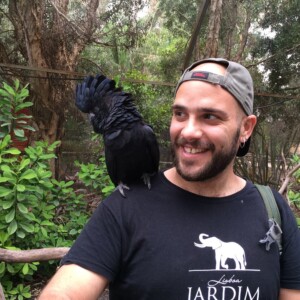
Ricardo Lemos de Figueiredo
University of Birmingham
Project
Enabling wildtype behavioural ecology in captive parrot species
Supervisors
Dr. Jackie Chappell, Dr. Susannah Thorpe
PhD Summary
Parrots, of the order Psittaciformes, are key species in tropical ecosystems around the world but many species are critically endangered because of anthropogenic impacts. Zoos and other captive collections therefore play a vital role as ‘arks’, preserving the species (both its genome and the unique adaptations that are fundamental to its success in the wild), and complementing in situ conservation efforts. However, parrots are challenging to keep in captivity as the challenges and opportunities provided by natural environments are difficult to replicate in captivity. Parrots need both clear flight space (to replicate travel between feeding patches) and complex climbing supports (to replicate foraging in the canopy), and these contradictory needs are difficult to fulfil in constrained captive enclosures. Breeding success (vital if zoos are to preserve the species) is often low, and with a small pool of potential mates, some individuals never pair bond. In a previous project, we have created an Enclosure Design Tool (EDT) to elicit wild-type behaviours in captive apes by replicating the physical and mental challenges of tropical forest within captive enclosures in zoos and sanctuaries. This studentship will allow us to extend these principles to parrots by providing a research base on the extent to which wild-type behaviours are missing or constrained in captive parrots. This will enable zoos and other captive collections to preserve both the genome and the unique behavioural adaptations of the species they care for.
What inspires you
My interest in the natural world was first inspired by my local zoo (Lisbon), which I used to visit while growing up. It was also there I started gaining awareness about animal welfare, threatened species and wildlife conservation issues, which pushed me towards a career in that field.
Previous activity
I started my career as a volunteer animal keeper at Lisbon Zoo, where I stayed for over three years. After moving to the UK to pursue higher education, and while doing my BSc in Animal Behaviour at Aberystwyth University, I volunteered as a Research Assistant for a local marine wildlife institution, where I helped recording and managing data on the local populations of marine mammals. Upon completion of my BSc, I went back to Portugal for the summer and worked on the Iberian lynx captive breeding and reintroduction programme, where I integrated the ethology team and assisted with the monitoring of the behaviour and reintroduction training of the captive lynx. Back in the UK again, I worked as a research assistant at Flamingo Land Zoo, where I assisted in several of the zoo’s conservation and research projects, with higher focus on the in situ project implemented by the zoo in the Udzungwa Mountains, Tanzania, where I also got to do six weeks of field work. Back to university, I did a MRes in Wildlife Behaviour and Conservation at the University of Chester, where I conducted a multi-zoo study on the behaviour, welfare and husbandry of mouse deer in Europe. Just before the start of this PhD, I worked for six months as an animal keeper at a zoo in the south of Portugal. I am also a member of the Research Committee of the British and Irish Association of Zoos and Aquariums (BIAZA), where I integrate the Research Engagement Group and assist with several tasks, including the co-ordination of the committee’s social media. On top of that, I manage my own website on zoo science, which I use to disseminate the work of zoos in conservation, research & education.”
Why did you choose doctoral research?
My previous experience showed me I am definitely interested in pursuing a career in scientific research and wildlife conservation. I believe undertaking Doctoral Research is a great way to further develop and improve the necessary skills to succeed as a researcher while enhancing my professional profile.
Why did you choose CENTA?
While searching for PhDs, I came across this research project, which was funded by CENTA, and completely met my personal interests and professional goals. Furthermore, after finding out more about CENTA, I noticed how well structured it was, with plenty of training and development opportunities. I then realised this was an incredible opportunity to pursue a PhD in a dream project, while being financially supported, developing vital skills in research and moving forward in my career.
Future plans
As you have probably realised by now, I am very interested in the zoo world and therefore my dream career is to work with zoo research and conservation. I believe studying here will help me achieving that, as I will be working on a very relevant project, developing key skills that I will be able to use in a future job and further developing my network in the world of science.
